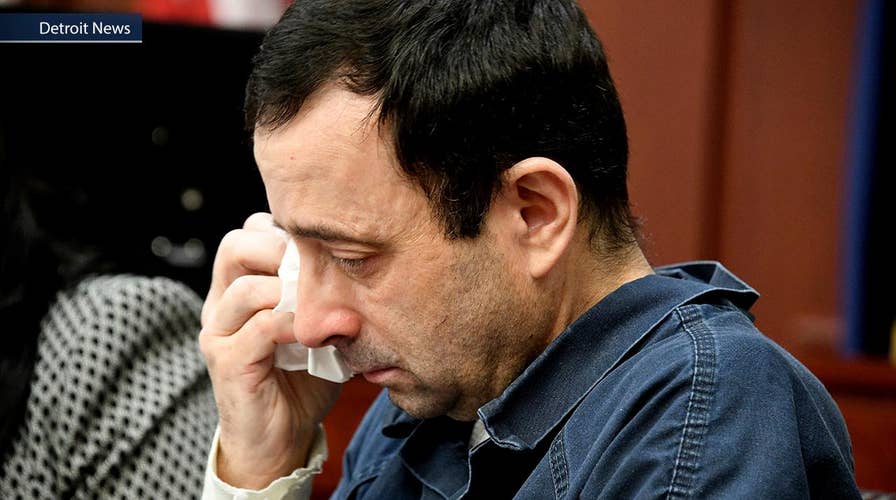Victims come face to face with Dr. Larry Nassar
The 54-year-old pleaded guilty to 10 counts to sexually assaulting 10 girls under the guise of medical treatment.
The #MeToo movement is uncovering horrifying abuses — some while authority figures knew and looked away. It’s time to talk about the enablers.
Last week, Eliza Dushku published a Facebook post accusing stunt coordinator Joel Kramer of sexually molesting her on the set of the film “True Lies” when she was 12. She wrote, “At the time, I shared what happened to me with my parents, two adult friends and one of my older brothers. No one seemed ready to confront this taboo subject then, nor was I.”
She asks, rightfully: “Why didn’t an adult on the set find his predatory advances strange — that over-the-top special attention he gave me?” Her abuser, she said even nicknamed her “Jailbait.” She says she’s “come to understand the terrible power dynamics that play into whistle-blowing by ‘subordinates’ against persons in power, how difficult it can be for someone to speak up. But I was a child.”
Director James Cameron, Jamie Lee Curtis and Arnold Schwarzenegger, all powerful figures in Hollywood who were involved in “True Lies,” today say they would’ve stepped in had they known of the abuse.
If a child in your care tells you they’re being molested, the right response is not to tell one powerful person and no one else. It’s to tell anyone and everyone in a position of power until something is done.
Dushku is not alone in coming forward and having her allegations go nowhere. Larry Nassar, a doctor at Michigan State University and for the USA Gymnastics team, is accused of molesting more than 140 girls. Nassar has admitted to abusing seven girls, three of whom were under the age of 13.
Even after the story broke open, some people continued to embrace him. According to one current Michigan State gymnast, coach Kathie Klages asked athletes last fall to sign a card for Nassar to let him know he was in their thoughts after the allegations were known.
In a heart-crushing statement to the court at Friday’s sentencing hearing, Nassar victim Kyle Stephens said the doctor began molesting her when she was 6-years-old and continued for years afterward. At 12, she told her parents, but Nassar convinced them she was lying. For years this caused a rift between Stephens and her parents. Her father eventually told her that he believed her and committed suicide shortly thereafter.
In a recent statement, Sue Booth-Forbes, Dushku’s guardian on the set, wrote that she reported “his behavior to someone with some clout, and that went nowhere.” She doesn’t name this person with clout but it was presumably not the police.
Booth-Forbes writes, “I also look back wishing I had done more but forgiving myself a bit because there was really nothing I could do given the power structure of the movie industry. Everyone involved has to turn a blind eye to such things in order to keep their jobs and not get in the way of the movie being made.”
The idea that there is nothing she could have done is wrong. If a child in your care tells you they’re being molested, the right response is not to tell one powerful person and no one else. It’s to tell anyone and everyone in a position of power until something is done.
No, the adults who looked away or dropped it after notifying one person aren’t as equally guilty as the abuser, but they are complicit when they choose not to believe a child asking for their help or to spare their own careers.
As another Nassar victim, Aly Raisman, said at Friday’s hearing: “If just one adult listened and had the courage and character to act, this tragedy could have been avoided.”
Asking why no one acted is important to stopping these kinds of abuse stories in the future. Adults need to understand their obligation to take the complaints of children seriously and to pursue justice on their behalf.
Both Nassar and Kramer were at the top of their field, but being good at your job is hardly proof of being a decent person. We owe our children more than to hear their complaints and then decide to spare the career of their abuser.
One ex-gymnast who complained to Michigan State about Nassar in 2014 was ignored. She then heard story after story of continued abuse.
“I stood up for myself, and I was silenced,” she said. “And now I hear that same thing that happened to me happened to all of these other women before and after it happened to me? How do you trust anybody?”
That’s a question all of the adults who looked the other way need to answer.

